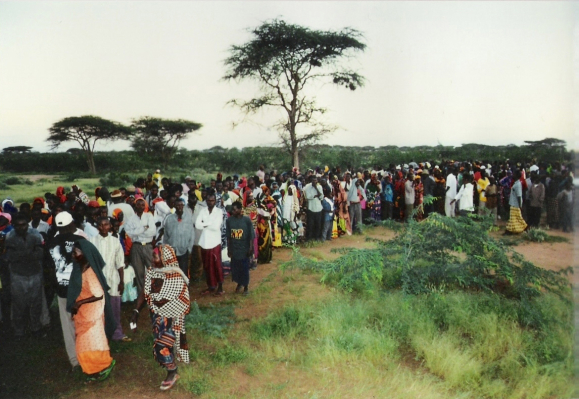This weekend two RefugePoint staff head to Istanbul for the first World Humanitarian Summit (WHS). As stated in a WHS tagline, the world is witnessing the highest level of human suffering since the Second World War. Global humanitarian budgets have skyrocketed in this millennium, from $2 billion in 2000 to $25 billion in 2014. Despite this record amount raised in 2014, it still left an unfunded gap of some $16 billion. The disparities between needs and resources are expected to increase further, with only an estimated half of the funds needed to respond to global crises raised in 2015.
The WHS on May 23-24 was spawned from the now broad recognition that the humanitarian system is no longer fit for purpose. As the UN High Commission for Refugees warned long before asylum-seekers started arriving in Europe in large numbers last summer, the humanitarian system is both broke and broken.
The aim of the WHS is to bring together world leaders, financial institutions, civil society and the private sector to jointly commit to new actions, funding and, importantly, ways of working to retool the system to match the challenges of our time.
Though not limited to refugees and migration issues, these topics are predictably prominent on the WHS agenda given that we’re witnessing the highest level of forced displacement ever recorded. With the seemingly endless layering of new crises on top of decades-old crises, the notion of humanitarian assistance as short-term emergency relief is becoming an anachronism. It is no longer sustainable to view displaced populations as the sole concern of a few specialized agencies that lack access to the considerably larger development coffers.
In the refugee context, this necessitates more support for countries hosting large numbers of refugees and more opportunities for refugees to transition from dependence on aid to self-reliance. In his report for the WHS, the UN Secretary General Ban Ki Moon lays out an Agenda for Humanity, which seeks to narrow the needs/resources gap in part by reducing or “ending need.” That simple but powerful phrase is an apt description of what RefugePoint and other refugee agencies are endeavoring to do — find durable solutions for refugees to resume productive, dignified lives. In other words, ending need.
A key step towards ending need is shifting from viewing refugees as burdens to recognizing them as potential economic assets and contributors to their host countries. Professor Alexander Betts of Oxford articulated this powerfully in his recent Skoll World Forum presentation and Ted Talk. Like all needed paradigm shifts, this one is more easily described than effected. For countries experiencing “mass influxes,” as they are ominously called, the idea of economically integrating hundreds of thousands of able contributors is likely no less daunting than providing those same people aid. Anyone who has struggled to put a volunteer or intern to good use understands that capitalizing on available labor is in itself labor-intensive, leaving aside the political, societal and operational barriers that would need to be addressed for broad scale refugee integration into labor markets. It’s easy to see how indefinite aid became the default response.
But now new resources and thinking are being put to use around self-reliance opportunities. In Jordan, for instance, a lot of exciting initiativesare underway currently, linking World Bank development loans with concessions on work permits for Syrian refugees, brokering partnerships with employers to hire refugees, low export tariffs to Europe for refugee-produced products, and the creation of new Special Economic Zones where at least half of the jobs would be reserved for Syrians.
These are positive new models that might very well help shine the path to a new relationship between refugees and host countries. What is clear is that there is not one silver bullet that will help “end need,” but rather multiple small advancements and initiatives combined will help pave the way.
At RefugePoint, we’ve been developing a demonstration project that we believe will help show a new way of responding to refugees in need. We’ve been working to continually improve the enabling environment for refugees in Nairobi over the past 10 years. We’ve developed a holistic service model that provides very time-limited assistance, stabilizes families and ultimately facilitates their self-reliance. We’ve helped link our clients with mainstream health care, education, and microfinance opportunities. Many now run small businesses (some employing Kenyans), pay licensing fees to the city councils, and increase the economic activity of their communities.
The latest announcements by the Kenyan government of its intention to close its refugee camps are yet another symptom of the untenable paradigm of refugee response that we have defaulted to globally. It is our hope that through replicable self-reliance initiatives such as ours and those of other partners, we can demonstrate to host countries that it can be a tenable proposition to welcome refugees and, in fact, can be in their economic interest to do so. Perhaps one good thing that can be said about this historical moment is that maintaining the status quo is not an option. New deals must be brokered at the highest levels to overcome the divide between humanitarian and development efforts and, at the operational level, new ways of working must be piloted to show what’s possible on a large scale. We look forward to bringing our learning to the WHS in support of the Agenda for Humanity and helping to more quickly end the need of refugees and other displaced populations.
